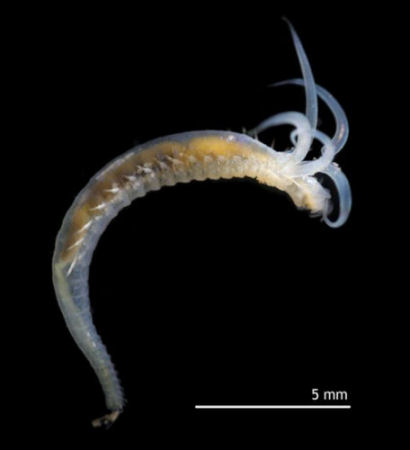Sunday 6th February
Today's contributor: Adrian Glover
My name is Adrian Glover, and my day-job back home is as a research scientist at the Natural History Museum, London. That's the one with the big dinosaur in the front hall and a lot of excited children doing circuit-training around its oversize tetrapod feet. If you were brought up in the UK, you probably went there at least once between the ages of 4 and 16. There was then a long gap, before you took your own kids there, just as soon as they learnt to walk and say the word 'dinosaur'.
So, you are asking, someone from the Natural History Museum in the Antarctic? That can only mean one thing: Antarctic Dinosaurs! Yes, super-strong, snow-white Dinosaurs with even nastier teeth and a handy blubber and fur layer to keep them active in the low, reptilian-unfriendly, Antarctic climes. Perhaps, you think, we are trawling up their bones right now from the icy depths, soon to be described in hallowed scientific journals, with a well-cut movie contract with Disney thrown in for good measure.
I am sorry to disappoint. We have not found any dinosaurs. And I donít study dinosaurs. I study worms. Yes, small wriggly worms. I can almost hear you move the mouse to click to the next blog post. But hear me out! These are not any worms. These are Antarctic worms! Bigger, fiercier and more of them than you can imagine. They can be beautiful. They can be scary. They can be 'significant in the global carbon cycle'. They can tell us more about the oceans of the Antarctic than a few bones ever could.

This Antarctic worm could change your life.
Photo by Adrian Glover.
But I am not going to talk about them either. Ha Ė just as you got interested, see? No, indeed today I have something else to get off my chest. Recently, we passed Elephant Island. Since then, in honor of that event, we have been watching an excellent old Channel 4 film called 'Shackleton'. Kenneth Branagh staring across the frozen wastes, contemplating the fate of his 'men'. Posh public school boys dressing up as girls to keep up morale. Gruff northern seaman-types going 'Grrrr' a lot when given orders.
It set me thinking, back to some of my previous Antarctic excursions. Endless arguments on one subject. The Battle of the Early Antarctic Explorers. Us science folk are found of acronyms, and I have one for this: BOTHERERS. That just about works, and sums it up. Two well-fed and warm modern-day Antarctic 'heroes' are propping up the bar in the Dog and Penguin:
'Amundsen was a devious dog-eating Norwegian, who cheated his way to the Pole by lying to Scott about his true intentions'
'Are you kidding me? This man took inspiration from one of the greatest explorers of all time, Nansen. He used the correct boat, which could not be crushed in ice. All his men could ski, and had years of experience driving dogs across the Arctic.'
'Well it is true that Amundsen was pretty handy on the ice. But Scott was very brave. And resourceful in other ways: he realised the importance of radio communications, and foresaw the value of tracked vehicles on the ice'
'Yeah right, and forgot 300 years of sea-farers knowledge on vitamin deficiency. For God's sake, Amundsen and his men actually put on weight on their polar journey. They sat and drank schnapps every evening in their home-made ice saunas!'
'Well, yes it is true that Scott made mistakes. But the weather was awful for him, and anyway he was a much better writer than that dullard Amundsen; he just made it boring. Too damn easy and not enough suffering for me.'
'Read Norwegian well do we? The simple truth is that travel on ice is not that hard, if you know how. The Norwegians already did. They live on the stuff.'
'Ok, I will admit that Scott was perhaps foolhardy. But still brave, and inspirational. Shackleton, however, was a true leader of men. The journey of the Endurance must be the greatest adventure ever told'
'True to some extent. If heroic failure is your thing, the story of the Endurance takes some beating. But what about the sucesses? Does anyone remember the follow up expeditions? The sealers and whalers who charted the coasts? The post-war period, culminating in the US led International Geophysical Year, setting up the first real science on the Antarctic continent. Those are my heroes too. True scientific visionaries, admittedly funded by politicians with an eye on strategic interests.'
'All right lets sum up. Amundsen was a bit boring, Scott was a bit of a fool and Shackleton the best leader in adversity, with the caveat that he should not have got into that adversity in the first place if he damn well knew better.'

Elephant Island: scene of yet another heroic British... failure.
Photo by Adrian Glover.
Members of the science team on project BOTHERERS always agree on one thing in the end: the need to read yet another weighty biography of an early 20th century polar explorer. Always available in the travel section of Waterstones, and at least once a year making the front table. The perfect book for dinosaur-lovers.
My plan? To read something else.
Adrian Glover
